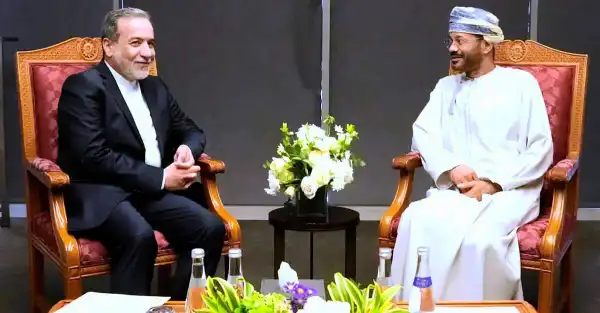
Iran and the United States plan to hold further discussions next week over Tehran's rapidly expanding nuclear program, Iranian state television reported Saturday after the first round of meetings between the two countries since President Donald Trump returned to the White House.
Iran's foreign minister later said the next round of nuclear talks with the US would take place on Saturday, April 19.
Iranian state television also said US Middle East envoy Steve Witkoff and Iranian Foreign Minister Abbas Araghchi “briefly discussed the issues in the presence of the Omani foreign minister” after the talks, the first direct contact between the two countries, which have been at odds for decades.
In a statement released Saturday afternoon, the White House described the discussions as “very positive and constructive,” adding that the issues that need to be addressed “are very complex.”
“Today's direct communication from Special Representative Witkoff was a step forward toward achieving a mutually beneficial outcome,” the White House said.
The two sides discussed for more than two hours at a location on the outskirts of Oman, concluding talks at about 5:50 p.m. local time. Talks began at about 3:30 p.m. local time.
Initial talks did not envisage an immediate, comprehensive agreement, but the stakes for the two countries, which have been in conflict for half a century, could not be higher.
US President Donald Trump has repeatedly threatened to carry out airstrikes on Iran's nuclear programme if no deal is reached.
Iranian officials have increasingly warned of the possibility of an attempt to build a nuclear weapon using stockpiles of uranium enriched to levels close to weapons grade.
Flight tracking data analyzed by The Associated Press (AP) showed a private jet from Pulkovo Airport in St. Petersburg, Russia, landed in Oman on Saturday morning.
U.S. Special Representative for the Middle East Steve Witkoff just met with Russian President Vladimir Putin there on Friday.
Meanwhile, Iran's Foreign Ministry released footage of a meeting between Tehran's top diplomat, Mr. Araghchi, and Omani Foreign Minister Badr al-Busaidi.
Iran's state news agency IRNA reported that Mr Araghchi outlined “Iran's position and key points of the talks, which will be conveyed to the American side.”
AP reporters spotted a convoy believed to be carrying Mr. Witkoff leaving Oman's Foreign Ministry building on Saturday afternoon and then quickly disappearing into a Muscat suburb.
The convoy entered the complex, and a few minutes later, Iranian Foreign Ministry spokesman Esmail Baghaei reported on the X social network that “indirect negotiations” had begun.
“These talks will take place at a location determined by the Omani host, with representatives of the Islamic Republic of Iran and the United States in the halls and on the sides, communicating their views and positions to each other through the Omani Foreign Minister,” Mr. Baghaei wrote.
About an hour later, Mr. Baghaei appeared on Iranian state television and confirmed that negotiations had been ongoing all along.
“The goal of the Islamic Republic of Iran is very clear: we have only one goal – to protect Iran's national interests,” he said.
“We are providing a real and sincere opportunity for diplomacy so that through dialogue we can move forward on the nuclear issue and, more importantly for us, on lifting sanctions.”
Mr Baghaei added: “Look, this is just the beginning. So it is natural that at this stage both sides are presenting their main positions through the Omani mediator. So we do not expect this round of talks to be long.”
The US government has not yet confirmed the start of negotiations.
Earlier, Mr. Araghchi spoke with Iranian journalists.
“If there is enough will on both sides, we will set a timetable. But it is too early to talk about that,” he said in an audio recording published by IRNA.
“It is now clear that the negotiations
Sourse: breakingnews.ie






